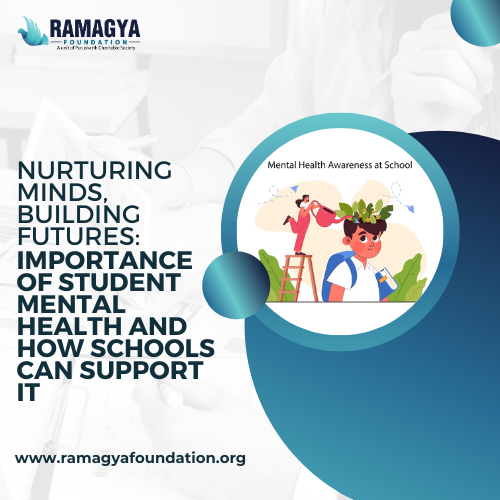In today’s fast-paced and demanding world, the importance of student mental health cannot be overstated. As young minds navigate the challenges of academics, peer pressure, and personal growth, they must have the support and resources they need to maintain a positive mental state. In this blog, we’ll delve into the significance of student mental health and explore how Ramagya School and its associated Foundation have embraced the cause, recently celebrating World Mental Health Week to spread the message that Mental Health is a universal human right[1].
The Imperative of Student Mental Health
Student mental health is critical to a student’s overall well-being, significantly impacting their academic success and future prospects. As educators and caregivers, it’s our responsibility to recognize and address the challenges young individuals face in managing their mental health. Research and statistics reveal the stark reality:
- Academic Performance: The relationship between student mental health and academic performance is undeniable. According to a study by the World Health Organization, students with good mental health tend to perform better academically.
- Peer Relationships: Positive mental health is pivotal in fostering healthy peer relationships. The CDC reports that 1 in 5 U.S. high school students experience bullying, which can harm their mental well-being.
- Long-Term Impact: Unaddressed mental health issues during school years can have long-term consequences. The National Institute of Mental Health suggests that untreated mental health issues can affect a person’s well-being into adulthood.
- Global Significance: The World Federation for Mental Health reports that mental disorders are prevalent worldwide, with half of all mental illnesses beginning by age 14.
Ramagya School’s Commitment to Student Mental Health
Recognizing the importance of student mental health, Ramagya School recently celebrated World Mental Health Week, highlighting the significance of mental well-being for all individuals. The message conveyed was simple yet profound: Mental Health is a universal human right. Ramagya School and its associated Foundation, Ramagya Foundation, have taken numerous initiatives to support students’ mental wellness, particularly those from underprivileged backgrounds.
Ramagya Foundation’s focus on student mental health is driven by the belief that education is not just about academics but also holistic development. The Foundation aims to create a nurturing environment where every student can thrive, irrespective of their socio-economic background.
Activities and Initiatives
In its quest to improve the mental health of students, our Foundation has introduced various activities and initiatives:
- Counseling Services: The Foundation offers counseling services for students, providing a safe and confidential space to express their concerns and seek guidance.
- Mental Health Workshops: Regular workshops and seminars on stress management, emotional intelligence, and coping strategies are organized to equip students with the skills to handle life’s challenges.
- Yoga and Mindfulness: Yoga and mindfulness practices are incorporated into the curriculum to promote relaxation and self-awareness.
- Mentorship Programs: Older students mentor younger peers, fostering a sense of belonging and support within the school community.
- Community Outreach: The Foundation extends its efforts to underprivileged communities, offering mental health awareness programs and support to those who may not have easy access to such services.
Stats on Student Mental Health
- According to the National Alliance on Mental Illness (NAMI), 1 in 6 U.S. youth aged 6-17 experience a mental health disorder yearly.
- The World Health Organization states that depression is the third leading cause of illness and disability among adolescents.
- A survey by the American Psychological Association found that 45% of teenagers say school pressures stress them.
The importance of student mental health is a universal concern that transcends cultural, geographical, and socio-economic boundaries. Ramagya School, in partnership with Ramagya Foundation, recognizes this critical need and has taken proactive steps to ensure every student has access to the mental health support and resources required to thrive.
Conclusion
As we move forward in this ever-changing world, educational institutions and foundations need to continue their dedication to improving students’ mental health. By doing so, we empower today’s youth and contribute to building a healthier, more resilient, and brighter future for all. Remember, the mental health of our students is a universal human right, and it is our collective responsibility to protect and nurture it.
Read our Article: How can Teachers help Students Manage their Exam Stress?
